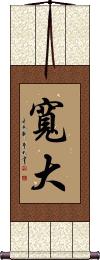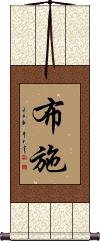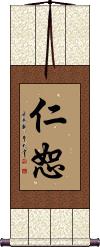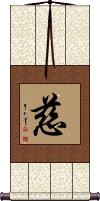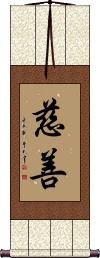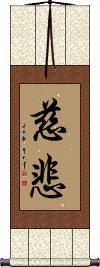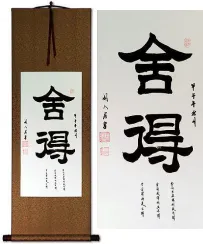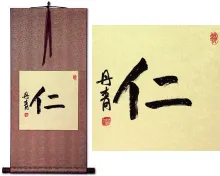Many custom options...
And formats...

Generosity in Chinese / Japanese...
Buy a Generosity calligraphy wall scroll here!
Personalize your custom “Generosity” project by clicking the button next to your favorite “Generosity” title below...
Generosity
寬大 is a Chinese, Japanese, and Korean word that means Generosity.
Generosity is giving and sharing. You share freely, not with the idea of receiving something in return. You find ways to give others happiness and give just for the joy of giving. Generosity is one of the best ways to show love and friendship.
寬大 can also be translated as charitable, magnanimity, liberality, or in some contexts, broad-mindedness.
Note: There is a tiny deviation in the first character when written in Japanese. If you choose our Japanese master calligrapher, the little dot on the lower right of the first character will be omitted. With or without the dot, this can be read in Chinese, Japanese Kanji, and old Korean Hanja.
See Also: Benevolence | Altruism | Charity
Dana: Almsgiving and Generosity
布施 is the Buddhist practice of giving known as Dāna or दान from Pali and Sanskrit.
Depending on the context, this can be alms-giving, acts of charity, or offerings (usually money) to a priest for reading sutras or teachings.
Some will put Dāna in these two categories:
1. The pure or unsullied charity, which looks for no reward here but only in the hereafter.
2. The sullied almsgiving whose object is personal benefit.
The first kind is, of course, the kind that a liberated or enlightened person will pursue.
Others will put Dāna in these categories:
1. Worldly or material gifts.
2. Unworldly or spiritual gifts.
You can also separate Dāna into these three kinds:
1. 財布施 Goods such as money, food, or material items.
2. 法布施 Dharma, as an act to teach or bestow the Buddhist doctrine onto others.
3. 無畏布施 Courage, as an act of facing fear to save someone or when standing up for someone or standing up for righteousness.
The philosophies and categorization of Dāna will vary among various monks, temples, and sects of Buddhism.
Breaking down the characters separately:
布 (sometimes written 佈) means to spread out or announce, but also means cloth. In ancient times, cloth or robs were given to the Buddhist monks annually as a gift of alms - I need to do more research, but I believe there is a relationship here.
施 means to grant, to give, to bestow, to act, to carry out, and by itself can mean Dāna as a single character.
Dāna can also be expressed as 檀那 (pronounced “tán nà” in Mandarin and dan-na or だんな in Japanese). 檀那 is a transliteration of Dāna. However, it has colloquially come to mean some unsavory or unrelated things in Japanese. So, I think 布施 is better for calligraphy on your wall to remind you to practice Dāna daily (or whenever possible).
Kindness and Forgiving Nature
仁恕 is a word in Chinese and Japanese that means something like benevolence with magnanimity or kindness with a forgiving nature.
If this describes you, then you are the type of person that I would like to call my friend.
This may not be the most common word in daily use, but it's old enough that it transcended cultures from China to Japan in the 5th century when Japan lacked a written language and absorbed Chinese characters and words into their language.
Note: 仁恕 is not commonly used in Korean.
Mercy / Compassion / Love
慈 is the simplest way to express the idea of compassion.
This can also mean love for your fellow humans, humanity, or living creatures. Sometimes this is extended to mean charity.
This term is often used in a Buddhist or Christian context. The concept was also spoken of by Laozi (Lao Tzu) in the Dao De Jing (Tao Te Ching).
慈 is considered the direct translation of the Sanskrit word मैत्री (maitrī) Pali word मेत्ता (mettā). In this context, it means benevolence, loving kindness, and goodwill.
This Chinese character is understood in Japanese but is usually used in compound words (not seen alone). Also used in old Korean Hanja, so it's very universal.
See Also: Mercy | Benevolence | Forgiveness | Kindness
Charity
There are a few different words used to express charity in Chinese characters, Japanese Kanji and old Korean Hanja but 慈善 is the most common.
Some of the other words describe acts such as “giving alms” etc.
Note: Sometimes this is translated as benevolence or benevolent.
Also, this considered to be one of the Seven Heavenly Virtues.
If you need a different meaning, just contact me.
See Also: Benevolence | Altruism
Mercy / Compassion / Buddhist Loving Kindness
Besides the title above, 慈悲 can also be defined as clemency or lenience and sometimes the act of giving charity.
In the Buddhist context, it can be defined as “benevolence,” “loving-kindness and compassion,” or “mercy and compassion.”
This Buddhist virtue is perhaps the most important to employ in your life. All sentient beings that you encounter should be given your loving kindness. And trust me, however much you can give, it comes back. Make your life and the world a better place!
This Chinese/Japanese Buddhist term is the equivalent of Metta Karuna from Pali or Maitri Karuna from Sanskrit.
慈 can mean loving-kindness by itself.
悲 adds a component of sorrow, empathy, compassion, and sympathy for others.
See Also: Benevolence
This in-stock artwork might be what you are looking for, and ships right away...
Gallery Price: $200.00
Your Price: $69.88
Gallery Price: $72.00
Your Price: $39.88
These search terms might be related to Generosity:
Charity
Compassion / Kindness
Kindness
Kindness / Benevolence
Kindness / Caring
Kindness and Forgiving Nature
Love and Respect / Kindness and Respect
Loving-Kindness Conquers All
Mercy / Compassion / Buddhist Loving Kindness
Not the results for Generosity that you were looking for?
Below are some entries from our dictionary that may match your Generosity search...
| Characters If shown, 2nd row is Simp. Chinese |
Pronunciation Romanization |
Simple Dictionary Definition |
恩寵 恩宠 see styles |
ēn chǒng en1 chong3 en ch`ung en chung onchou / oncho おんちょう |
More info & calligraphy: Grace / Favorgrace; favour; favor |
肚 see styles |
dù du4 tu hara はら |
belly (1) abdomen; belly; stomach; (2) womb; (3) one's mind; one's real intentions; one's true motive; (4) courage; nerve; willpower; (5) generosity; magnanimity; (6) feelings; emotions; (7) wide middle part; bulging part; (8) inside; interior; inner part; (9) (physics) anti-node; (suf,ctr) (10) counter for hard roe; (11) counter for containers with bulging middles (pots, vases, etc.) |
腹 see styles |
fù fu4 fu fuku はら |
abdomen; stomach; belly (1) abdomen; belly; stomach; (2) womb; (3) one's mind; one's real intentions; one's true motive; (4) courage; nerve; willpower; (5) generosity; magnanimity; (6) feelings; emotions; (7) wide middle part; bulging part; (8) inside; interior; inner part; (9) (physics) anti-node; (suf,ctr) (10) counter for hard roe; (11) counter for containers with bulging middles (pots, vases, etc.) The belly. |
量 see styles |
liàng liang4 liang ryou / ryo りょう |
capacity; quantity; amount; to estimate; abbr. for 量詞|量词[liang4 ci2], classifier (in Chinese grammar); measure word (n,n-suf) (1) quantity; amount; volume; capacity; portion (of food); (2) (See 度量・1) generosity; magnanimity; tolerance; (3) pramana (means by which one gains accurate and valid knowledge; in Indian philosophy); (surname, female given name) Ryō pramāṇa. Measure, capacity, length, ability; to measure, deliberate; a syllogism in logic, v. 比量. A syllogism, consisting of 宗 pratijñā, proposition; 因 hetu, reason; 喩 udāharaṇa, example; but the syllogism varies in the number of its avayava, or members. There are other divisions from 2 to 6, e.g. 現量 and 比量 direct or sense inferences, and comparative or logical inferences; to these are added 聖教量 arguments based on authority; 譬喩量 analogy; 義准 postulation, or general assent; and 無體 negation, or non-existence. |
仁侠 see styles |
ninkyou / ninkyo にんきょう jinkyou / jinkyo じんきょう |
(adj-na,n,adj-no) chivalry; generosity; heroism; chivalrous spirit; helping the weak and fighting the strong |
仁王 see styles |
rén wáng ren2 wang2 jen wang niwa にわ |
the two guardian Deva kings; (personal name) Niwa The benevolent king, Buddha; the name Śākya is intp. as 能仁 able in generosity. Also an ancient king, probably imaginary, of the 'sixteen countries' of India, for whom the Buddha is said to have dictated the 仁王經, a sutra with two principal translations into Chinese, the first by Kumārajīva styled 仁王般若經 or 佛說仁王般若波羅蜜經 without magical formulae, the second by Amogha (不空) styled 仁王護國般若波羅蜜經, etc., into which the magical formulae were introduced; these were for royal ceremonials to protect the country from all kinds of calamities and induce prosperity. |
任侠 see styles |
ninkyou / ninkyo にんきょう |
(adj-na,n,adj-no) chivalry; generosity; heroism; chivalrous spirit; helping the weak and fighting the strong; (given name) Ninkyō |
十德 see styles |
shí dé shi2 de2 shih te jittoku |
The ten virtues, powers, or qualities, of which there are several groups, e.g. in the 華嚴經,十地品 there are 法師十德 the ten virtues of a teacher of the Law, i.e. he should be well versed in its meaning; able widely to publish it; not be nervous before an audience; be untiring in argument; adaptable; orderly so that his teaching can be easily followed; serious and dignified; bold and zealous; unwearied; and enduring (able to bear insult, etc.). The 弟子十德 ten virtues or qualities of a disciple according to the 大日經疏 4, are faith; sincerity; devotion to the trikāya; (seeking the) adornment of true wisdom; perseverance; moral purity; patience (or bearing shame); generosity in giving; courage; resoluteness. |
大拏 大拿 see styles |
dàn á dan4 a2 tan a Daina |
sudana, 須達拏, 須大拏, 蘇達拏 ; i.e. Sakyamuni as a prince in a former life, when he forfeited the throne by his generosity. |
大揚 see styles |
ooyou / ooyo おおよう |
(adjectival noun) largeheartedness; liberality; catholicity; generousness; generosity; magnanimity |
宥恕 see styles |
yuujo / yujo ゆうじょ |
(noun, transitive verb) forgiveness; generosity |
寛容 see styles |
kanyou / kanyo かんよう |
(n,adj-na,vs,vt) tolerance; open-mindedness; forbearance; generosity; magnanimity; (personal name) Hiroyasu |
寛恕 see styles |
kanjo かんじょ |
(noun - becomes adjective with の) magnanimity; forgiveness; generosity; (personal name) Hiroyoshi |
度量 see styles |
dù liàng du4 liang4 tu liang doryou / doryo どりょう |
measure; tolerance; breadth; magnanimity; (math.) metric (1) generosity; magnanimity; tolerance; (2) length and capacity; measures |
施他 see styles |
shī tā shi1 ta1 shih t`a shih ta seta |
generosity |
施戒 see styles |
shī jiè shi1 jie4 shih chieh sekai |
generosity and morality |
木底 see styles |
mù dǐ mu4 di3 mu ti bokutei / bokute ぼくてい |
(given name) Bokutei mukti, 解脫 deliverance, liberation, emancipation; the same meaning is given to 目帝羅 mucira, which has more the sense of being free with (gifts), generosity. |
気前 see styles |
kimae きまえ |
generosity |
海恕 see styles |
kaijo かいじょ |
(usu. 御海恕, ご海恕 in letters) (See 海容) magnanimity; forgiveness; generosity |
義侠 see styles |
gikyou / gikyo ぎきょう |
chivalry; generosity |
薄厚 see styles |
bó hòu bo2 hou4 po hou |
meanness and generosity; intimacy and alienation |
襟度 see styles |
jīn dù jin1 du4 chin tu kindo きんど |
(literary) breadth of mind magnanimity; generosity; welcoming personality |
雅量 see styles |
yǎ liàng ya3 liang4 ya liang garyou / garyo がりょう |
magnanimity; tolerance; high capacity for drinking magnanimity; generosity; tolerance; (given name) Masakazu |
五邪命 see styles |
wǔ xié mìng wu3 xie2 ming4 wu hsieh ming go jamyō |
(五邪) The five improper ways of gain or livelihood for a monk, i. e. (1) changing his appearance, e. g. theatrically; (2) advertising his own powers and virtue; (3) fortuning by physiognomy, etc.; (4) hectoring and bullying; (5) praising the generosity of another to induce the hearer to bestow presents. |
大力王 see styles |
dà lì wáng da4 li4 wang2 ta li wang Dairiki ō |
King Powerful, noted for his unstinted generosity. Indra to test him appeared as a Brahman and asked for his flesh; the king ungrudgingly cut of and gave him his arm. Indra was then Devadatta, King Powerful was Śākyamuni; v. 菩薩藏經 (下). |
祠祀施 see styles |
cí sì shī ci2 si4 shi1 tz`u ssu shih tzu ssu shih shijise |
devoted to generosity |
布施波羅蜜 布施波罗蜜 see styles |
bù shī bō luó mì bu4 shi1 bo1 luo2 mi4 pu shih po lo mi fuse haramitsu |
perfection of generosity |
Variations: |
kiu きう |
breadth of mind; generosity; magnanimity |
Variations: |
hara はら |
(1) abdomen; belly; stomach; (2) (See 胎・はら) womb; (3) one's mind; one's real intentions; one's true motive; (4) courage; nerve; willpower; (5) generosity; magnanimity; (6) feelings; emotions; (7) wide middle part; bulging part; (8) inside; interior; inner part; (9) {physics} anti-node; (suf,ctr) (10) counter for hard roe; (suf,ctr) (11) counter for containers with bulging middles (pots, vases, etc.) |
Variations: |
kiu きう |
breadth of mind; generosity; magnanimity |
Click here for more Generosity results from our dictionary
The following table may be helpful for those studying Chinese or Japanese...
| Title | Characters | Romaji (Romanized Japanese) | Various forms of Romanized Chinese | |
| Generosity | 寬大 宽大 | kandai | kuān dà / kuan1 da4 / kuan da / kuanda | k`uan ta / kuanta / kuan ta |
| Dana: Almsgiving and Generosity | 布施 | fuse | bù shī / bu4 shi1 / bu shi / bushi | pu shih / pushih |
| Kindness and Forgiving Nature | 仁恕 | jinjo | rén shù / ren2 shu4 / ren shu / renshu | jen shu / jenshu |
| Mercy Compassion Love | 慈 | ji | cí / ci2 / ci | tz`u / tzu |
| Charity | 慈善 | ji zen / jizen | cí shàn / ci2 shan4 / ci shan / cishan | tz`u shan / tzushan / tzu shan |
| Mercy Compassion Buddhist Loving Kindness | 慈悲 | ji hi / jihi | cí bēi / ci2 bei1 / ci bei / cibei | tz`u pei / tzupei / tzu pei |
| In some entries above you will see that characters have different versions above and below a line. In these cases, the characters above the line are Traditional Chinese, while the ones below are Simplified Chinese. | ||||
Successful Chinese Character and Japanese Kanji calligraphy searches within the last few hours...
